Events
| Name | organizer | Where |
|---|---|---|
| MBCC “Doing Business with Mongolia seminar and Christmas Receptiom” Dec 10. 2025 London UK | MBCCI | London UK Goodman LLC |
NEWS
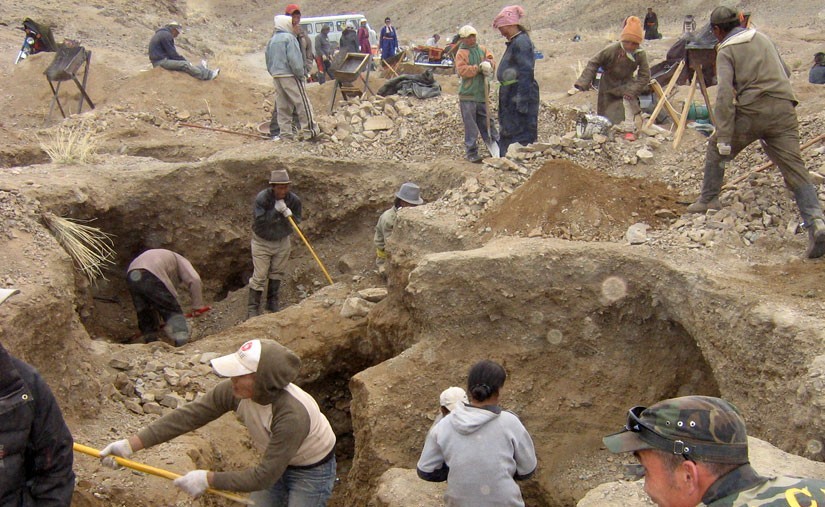
Impacts of COVID-19 are currently low, but uncertainty in Artisanal Gold Mining Communities remains high www.artisanalgold.org
Since Mongolia transitioned away from central planning in 1990, mining has come to play a dominant role in the economy. In 2016, the mineral sector accounted for 20.6% of Mongolia’s GDP, 80% of its exports, 30% of the national budget revenue, and more than 70% of the country’s foreign direct investment. Gold is the single largest mineral by value produced in Mongolia. In 2019, the Central Bank of Mongolia bought 15.2 tonnes of gold of which 48% or 7.4 tonnes were supplied by individuals including artisanal and small-scale miners[1].
Artisanal and small-scale gold mining (ASGM) operations are present in as many as fourteen of the country’s twenty-one provinces. Artisanal miners are estimated to number somewhere between 40,000 to 60,000 people, or 12%-20% of Mongolia’s rural labor force. A third of these miners are women.
Following the news of the outbreak of COVID-19 in neighbouring China, Mongolian authorities took immediate and rapid measures to prevent the virus from entering the country. The Mongolian government closed all border crossings and suspended universities, public institutions, and public events for nearly six weeks, starting very early in the last week of January 2020 and continuing until March 2, 2020. This has since been extended to April 30, 2020. On April 14, authorities announced that schools would remain closed until September 1, 2020.
Authorities credit these restrictions with keeping the number of COVID-19 infections in Mongolia quite low, though those numbers are now rising. With a population of around 3.2 million, Mongolia had as of April 14, 2020 reported 30 cases of COVID-19, an increase of 13 cases from the day before. Most of these cases were actually Mongolian citizens repatriated from abroad who had travelled through Russia on their way home. To date, there have been no deaths.
Had the virus not been kept out so effectively it might have hit artisanal mining communities particularly hard, as is evident in other countries (see Burkina Faso and the Philippines). Closing artisanal mining can be devastating because many artisanal miners in Mongolia earn income solely from their day-to-day labor and need to sell the gold they recover for sustenance. This leaves miners highly vulnerable to any shut down or interruptions in the gold supply chain. To date, thankfully, the impacts of COVID-19 remain minimal.
The gold supply chain is weakened but not broken
According to miners and gold traders, local gold prices in Mongolia have not yet been strongly affected. Mongolia has tightened its isolation measures twice – once for 10 days during the Lunar New Year celebrations, and a second time for a few days after March 10, when the first case of COVID-19 was reported. During these days, miners were prohibited from travelling to their mine sites but at all other times, mining has continued as normal. During February and March, aside from a minor increase in the prices of meat and rice in some areas, the supply and prices of food and common goods have also not altered drastically.
While no dramatic impact from COVID-19 has yet been observed, the closure of all educational institutions at all levels does risk harming women miners’ productivity. Women miners carry the double burden of taking care of their children and families as well as earning an income. With schools closed, female miners are faced with the choice of foregoing income to stay home and care for their children, or bringing their children with them to an active mine site with its risks.
A miner’s story
“During the first lockdown, we were quarantined in Tunkhel village, and a few miners who were working at the Bulag ASM site were also stranded as the area became inaccessible,” said B. Myagmarsuren, a miner in Selenge province. Myagmarsuren has been selling gold to a processing plant in Bornuur Soum in Tuv province for about ten years at a competitive price. As recently as April 8, this processing plant was buying gold at 130,000 MNT (about US$46.67) per gram, or about 88% or world price. As world gold prices have increased, the price offerred by this processing plant has actually increased to 140,000 MNT (US$ 50.31) or about 90.5% of world price.
Myagmarsuren added that if other preventive measures are announced, such as an extended in-country travel ban or lockdown, then “we would have to cease activities or work in a very limited scope, making us very vulnerable,” she said.
Miners believe that interrupting their ability to extract ore and sell gold would freeze the local economy. Gas stations and grocery stores are mainly dependent on the local gold market. For many communities, the artisanal gold sector is one of their most important sources of income.
Formalization of Mongolia’s artisanal gold mining sector an added challenge
Artisanal and small-scale gold mining in Mongolia remains a largely informal sector. The Artisanal Gold Council has been working since 2019 in partnership with the government authorities through its GEF-funded planetGOLD project towards providing improved conditions for formalization.
Hoping the current situation surrounding COVID-19 does not get worse, one miner said: “Cancelling the formalization process is another fear we have … it would drive artisanal miners into the black market and consider operating in illegal ways to extract gold.”
Should conditions surrounding the artisanal gold sector in Mongolia worsen due to COVID-19, formalized miners may be less vulnerable than the informal ones because they would have a higher chance of receiving government assistance. In an odd way, the current health crisis could also be an opportunity. Governments looking to mitigate the crisis might come through with loans or assistance programs for formalized miners and thereby create a lasting incentive with clear benefits for the informal parts of the sector to move forward with their own formalization efforts. Many mining communities continue to dream of a scenario in which the artisanal gold mining sector is regarded just like any other small to medium enterprise in the country and the COVID-19 crisis makes a good example of why it is important to realize that dream.
The AGC in Mongolia and planetGOLD
The AGC has been working on artisanal mining issues in Mongolia for several years is a proud participant in the country’s planetGOLD programme. PlanetGOLD is an innovative programme that aims to improve the lives of artisanal and small-scale gold miners by focusing on four core areas: technical solutions, access to finance, formalization, and knowledge creation/awareness raising.
...
SEC: MNT 150,000 fine for not wearing face masks www.montsame.mn
Ulaanbaatar /MONTSAME/. At today’s press briefing by the State Emergency Commission (SEC), Colonel B.Uuganbayar, Deputy Chief of the National Emergency Management said that “Let’s wear face masks” public campaign is running across the nation to promote the use of protective face masks in prevention of the spread of the COVID-19 and residents could be considered to intentionally harm other people's health if caught not wearing face masks in public places and fined MNT 150,000 for under the Law on Infringement.
Even though it was not compulsory, wearing protective face masks in public has been commonplace since Mongolia imposed partial quarantine due to the COVID-19 pandemic back in late January. However, the SEC sees that the public calmed down too soon and some people started walking outside without one.
Despite the price rises, single use surgical masks or reusable cotton face masks are not that difficult to buy in Mongolia as they are just about sold in every pharmacy, retail store and supermarket.
Moreover, heads of each unit at khoroo of Ulaanbaatar city are granted with the duty of public police in order to maintain public order and safety and to enhance control on public compliance with mandatory face mask order.

Mongolia's export decreased by 41.5 percent www.montsame.mn
Ulaanbaatar/MONTSAME/. In the first quarter of 2020, Mongolia traded with 121 countries from all over the world. The total trade turnover reached USD 2.2 billion, of which USD 1.0 billion were exports and USD 1.2 billion were imports. Total foreign trade turnover decreased by USD 860.1 million (28.1%), of which exports decreased by USD 735.9 million (41.5%) and imports decreased by USD 124.2 million (9.7%) compared to the same period of the previous year.
The foreign trade balance was in deficit of USD 125.8 million, while it was in surplus of USD 485.9 million in the first quarter of 2019, and decreased by USD 611.7 million from the same period of 2019.
Our two neighbors, China and Russia have the highest shares in total foreign trade turnover. Trade with China reached USD 1.2 billion in the first three months of 2020, which is 56.5% of total trade turnover. Exports to China account for 87.3% of total exports. Bituminous coal and copper concentrates accounted for 26.7% and 38.8% of total exports to China. Gold accounted for 84.0% of goods exported to the United Kingdom, fluorspar -- for 91.6% of total export good to Russian Federation and bituminous coal -- for 51.7% of goods exported to Singapore.
The decrease worth USD 735.9 million in the export was due to the decrease in exports of USD 115.6 million in gold, USD 152.6 million in copper concentrates and USD 391.3 million in coal.
In the first quarter of 2020, 33.5% of the total imports were from Russia, 29.0% was from China, 7.6% was from Japan, 4.6% was from the USA and 4.0% was from the Republic of Korea, which are accounting for 78.7% of the total import.
54.1% of the total imports from Russia were petroleum products, 64.7% of the total imports from Japan were cars, and 9.3% of the total imports from China were electricity, 3.8% were trucks and the remaining percentage was imports of other products from China.
The USD 124.2 million decrease in imports from the same period of the previous year was mainly due to USD 36.3 million decrease in car imports and USD 15.3 million decrease in truck import.
Exports of mineral products, textiles and textile articles, natural or cultured stones, precious metals jewelry made up 95.8 percent of the total export. On the other hand, 69.3 percent of the total imports was mineral products, machinery, equipment, electric appliances, transport vehicle and its spare parts and food products.
Source: National Statistics Office
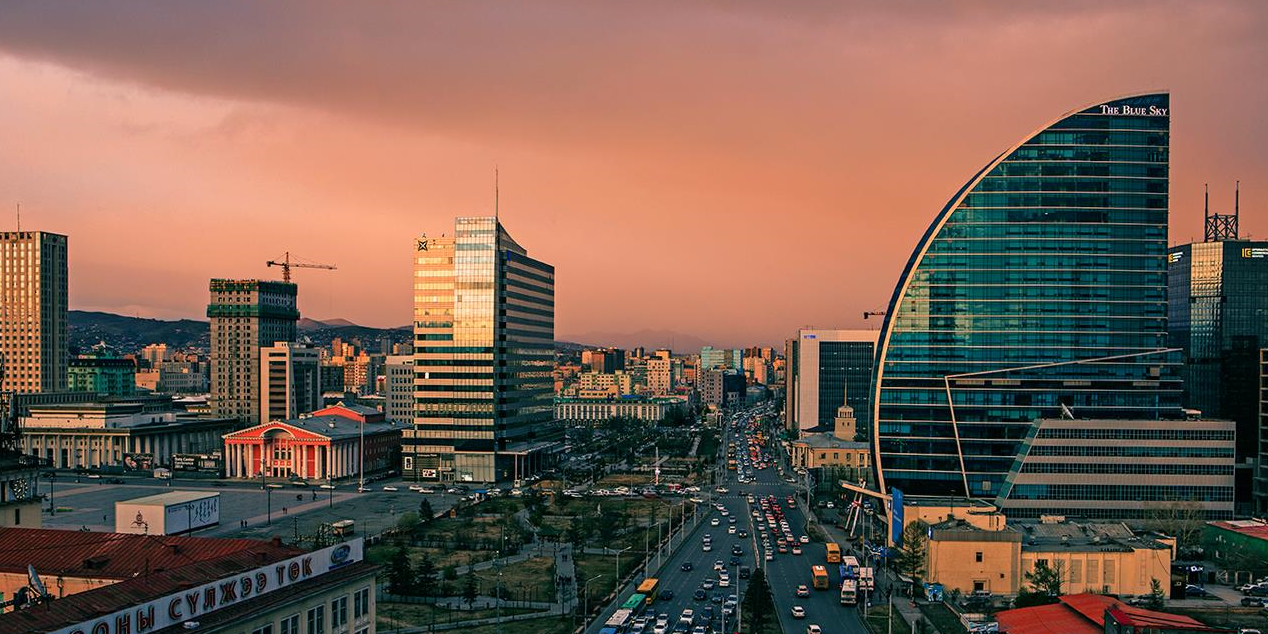
Equilibrated balance shows a deficit of MNT 276.0 billion www.montsame.mn
Ulaanbaatar/MONTSAME/. According to the preliminary results in the first quarter of 2020, the total revenue of the general Government budget amounted to MNT 2.2 trillion, and MNT 2.1 trillion of which accounted for equilibrated revenue. Total equilibrated revenue was sharing 93.2% of the general government budget revenue.
Total expenditure and net lending amounted to MNT 2.3 trillion, resulting in a deficit of MNT 276.0 billion in the equilibrated balance. However, in March 2020, total revenue and grants of General Government Budget reached MNT 760.2 billion, increased by MNT 63.5 billion or 9.1% and total expenditure and net lending amounted to MNT 860.5 billion, increased by MNT 12.6 billion or 1.1% compared to the previous month. General Government budget revenue was comprised of 86.0% of tax revenue, 7.2% of non-tax revenue, 6.5% of the future heritage fund and 0.3% of the stabilization fund.
In the first quarter of 2020, tax revenue reached MNT 1.9 trillion, decreased by MNT 58.9 billion or 3.0% compared to the same period of the previous year. This growth was mainly due to decreases of MNT63.9 billion or 29.9% in other taxes revenue and MNT 33.9 billion or 15.9% in excise taxes revenue, while there was an increase by MNT 20.5 billion or 4.7% in social security revenue, MNT 11.2 billion or 2.9% in value-added taxes and MNT 4.5 billion or 16.3% in property tax.
In the first quarter 2020, social security contributions revenue increased by 1.8 points, income tax by 1.3 points and value-added tax revenue by 1.2 points, while other taxes revenue decreased by 2.8 points and excise taxes revenue by 1.4 points and foreign activity revenues by 0.1 points as compared to the same period of the previous year.
In the first quarter of 2020, general government budget expenditure and net lending increased by MNT 380.7 billion or 19.3% compared to the same period of the previous year, totaling up to MNT 2.3 trillion by preliminary results. It was primarily affected by an increase of MNT 332.1 billion or 18.4% in current expenditure and MNT 73.0 billion or 43.4% in capital expenditure.
Source: National Statistics Office
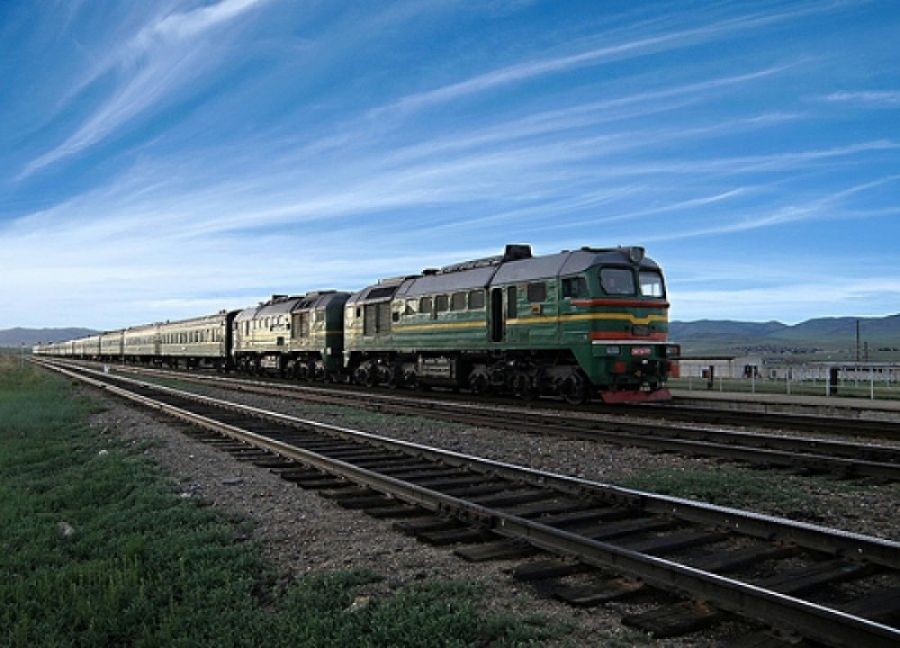
Transportation revenue decreases by 25 percent www.montsame.mn
Ulaanbaatar /MONTSAME/. In the first quarter of 2020, 10.2 million tons of freight were carried in total by all types of transport means which decreased by 5.1 million tons (33.4%) compared with the same period of previous year. The decrease was mainly due to 5.6 million tons (64.2%) of decrease in road freight.
In the first quarter of 2020, 29.1 million passengers (double counting) were carried which means the carried passengers decreased by 13.4 million (31.4%) compared with the same period of the previous year. It was also due to the decrease of 13.2 million (31.6%) passengers in road transport.
In reference period, revenue from all types of transport reached MNT 311.9 billion. The figure represents a fall of MNT 104.3 billion (25.1%) compared with the same period of the previous year. The revenue from road and air transport decreased by MNT 75 billion (46.6%) and MNT 40.8 billion (44.0%) respectively. Whereas the revenue from railway increased by MNT 11.4 billion (7.0%) compared with the same period of previous year.
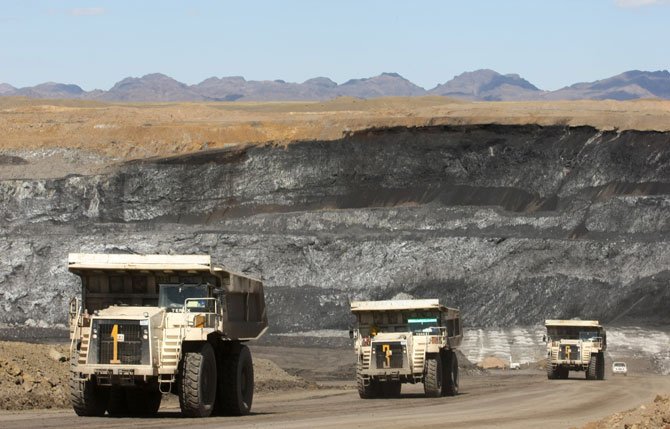
Erdenes TT coal exports – practically back to normal www.news.mn
State owned Erdenes Tavan Tolgoi is one of the most important companies in Mongolia. Recently, the enterprise came back to life, as some of the restrictions imposed by the coronavirus pandemic were lifted. Thus, between 1 and 12 April, it produced a total of 3.5 million tonnes of coal from its East and West Tsankh mines located in the South Gobi Province. The company has transported a total of 321 thousand of tonnes coal and exported nearly 6000 tonnes of coal to China. In other words, Erdenes TT is now operating at almost normally rates after Mongolia reopened its border with China earlier this month. The country closed its borders with China in order to prevent the spread of coronavirus in mid-February.
...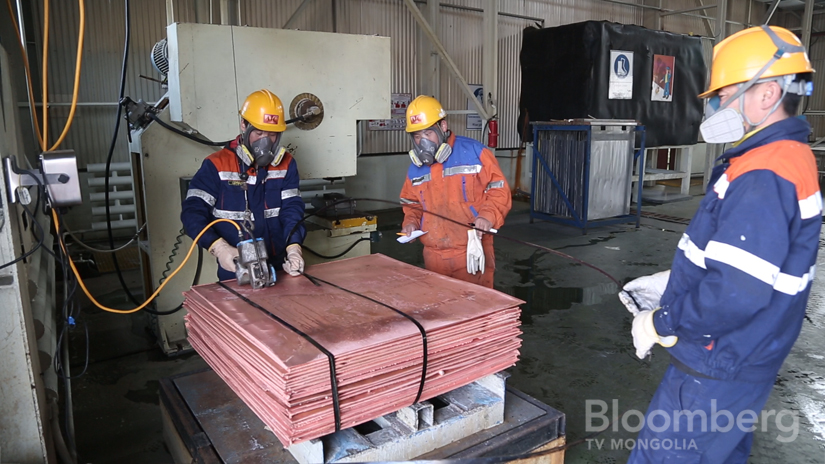
Sales of industrial production decreased by 35 percent www.montsame.mn
Ulaanbaatar/MONTSAME/. According to the preliminary results, the gross industrial output reached MNT 3.1 trillion, in the first quarter of 2020, showing a decrease of MNT 778.3 billion (19.9%) from the same period of the previous year. This decrease was mainly due to the decrease in mining and quarrying gross output by MNT 859.1 billion (29.8%), while manufacturing output increased by MNT 23.2 billion (3.3%), electricity, thermal energy and water supply output by MNT 57.6 billion (17.2%), respectively.
In the first quarter of 2020, the mining and quarrying gross output was decreased by MNT 859.1 billion (29.8%) from the same period of the previous year. This decrease was mainly due to decreases in the mining of coal and lignite by MNT 600.7 billion (46.0%), extraction of crude petroleum by MNT 167.6 billion (70.4%) and mining of metal ores by MNT 91.8 billion (7.0%), respectively.
Out of the mining and quarrying gross output, 60.4 percent was comprised from the mining of metal ores, 34.9 percent was from the mining of coal and lignite, 3.5 percent was from the extraction of crude petroleum and 1.2 percent was from other mining and quarrying in the first quarter of 2020.
By the preliminary results of the first quarter of 2020, in the mining and quarrying sector, the extraction of gold was increased by 84.4 percent compared to the same period of the previous year. In the manufacturing sector, concentrated coal, lime, milk, wheat flour, productions of pure water, soft drink, juice were increased by 4.9 percent to 53.1 percent compared to the same period of the previous year. By the preliminary results of the first quarter of 2020, the production of coal briquette was increased by 5.6 times more compared to the same period of the previous year.
Moreover, in the mining and quarrying sector, extraction of flour spar, brown coal, copper concentrate, iron ore, hard coal and crude oil was decreased by 2.0 percent to 72.4 percent. In the manufacturing sector, alcoholic beverage, productions of metal foundries, combed cashmere, copper cathode, cashmere products, metal steel, meat, cement are decreased by 3.5 percent to 71.8 percent compared to the same period of the previous year.
By the preliminary results of the first quarter of 2020, the sales of industrial production reached MNT 3.0 trillion, decreased by MNT 1.6 trillion (35.0%) from the same period of the previous year. This decrease was mainly resulted from the decrease of MNT 1.6 trillion (48.1%) in sales of mining and quarrying and MNT 96.0 billion (9.5%) in sales of manufacturing, while the sales of electricity, thermal energy and water supply were increased by MNT 58.4 billion (17.4%).
For the total sales of industrial production, MNT 1.6 trillion (54.2%) were from export, of which the export of mining and quarrying was MNT 1.4 trillion (83.7%) and the export of manufacturing was MNT 267.2 billion (16.3%).
For the sales of mining and quarrying production, MNT 1.4 trillion (83.7%) was comprised from the export, of which 67.9 percent was from the mining of metal ores, 25.9 percent was from the mining of coal and lignite, 3.6 percent was the extraction of crude petroleum, 2.6 percent was other from mining and quarrying. 2.6 percent was other from mining and quarrying.
Source: National Statistics Office
...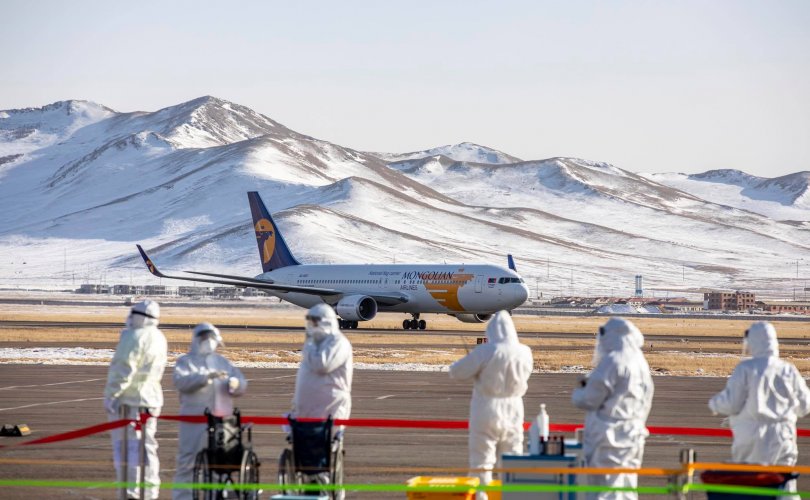
Total COVID-19 cases in Mongolia jump to 30, with 5 recovered www.montsame.mn
At today’s 11 AM daily press briefing of the Ministry of Health, D.Nyamkhuu, Director of the National Center of Communicable Diseases (NCCD) confirmed 13 newly detected cases of COVID-19.
On April 13, yesterday, the NCCD conducted 502 tests for coronavirus and 13 Mongolian students aged between 19 and 23, who arrived from Russia on April 11, tested positive. The patients, except one, was under isolation at the NCCD in Ulaanbaatar separate from one another, and one patient who was staying at an isolation facility in Darkhan-Uul aimag was brought to the NCCD today to begin treatment.
It was earlier reported that on April 11, Mongolia allowed entry to 282 Mongolians who traveled to Ulan-Ude city of Russia from Moscow and Irkutsk cities to return home as Mongolian borders are closed to all passengers due to the COVID-19 pandemic.
“20 of them were put under separate isolation due to suspicious symptoms and one of them was confirmed to have diagnosed with COVID-19 yesterday, making the total number of Mongolia’s coronavirus cases 17 as of April 13. And the 13 people, who were tested positive for the virus most recently, were all found to have come into close contact with the '17th patient'," says A.Ambaselmaa, Head of the Surveillance Department of the NCCD.
Mr. Nyamkhuu also announced that one more coronavirus patient has recovered and was released from hospital yesterday, bringing the total number of people who have fully recovered to 5. The previous four recovered people are already discharged from hospital, two of whom are self-isolating themselves at home and the remaining two are staying at isolation facilities under medical supervision. All of the recovered patients will be tested for COVID-19 frequently, say health ministry officials.
Currently, there are 25 people infected with COVID-19 being treated at the NCCD and all of them are in stable condition.
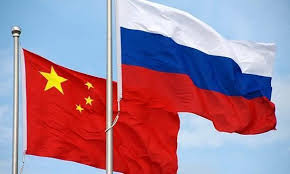
Russian border becomes China's frontline in fight against second virus wave www.reuters.com
SUIFENHE, China (Reuters) - China’s northeastern border with Russia has become a frontline in the fight against a resurgence of the coronavirus epidemic as new daily cases rose to the highest in nearly six weeks - with more than 90% involving people coming from abroad.
Having largely stamped out domestic transmission of the disease, China has been slowly easing curbs on movement as it tries to get its economy back on track, but there are fears that a rise in imported cases could spark a second wave of COVID-19.
A total of 108 new coronavirus cases were reported in mainland China on Sunday, up from 99 a day earlier, marking the highest daily tally since March 5.
Imported cases accounted for a record 98. Half involved Chinese nationals returning from Russia’s Far Eastern Federal District, home to the city of Vladivostok, who re-entered China through border crossings in Heilongjiang province.
“Our little town here, we thought it was the safest place,” said a resident of the border city of Suifenhe, who only gave his surname as Zhu.
“Some Chinese citizens - they want to come back, but it’s not very sensible, what are you doing coming here for?”
The border is closed, except to Chinese nationals, and the land route through the city had become one of few options available for people trying to return home after Russia stopped flights to China except for those evacuating people.
Streets in Suifenhe were virtually empty on Sunday evening due to restrictions on movement and gatherings announced last week, when authorities took preventative measures similar to those imposed in Wuhan, the central Chinese city where the pandemic ripping round the world first emerged late last year.
The total number of confirmed cases in mainland China stood at 82,160 as of Sunday. At the peak of the first wave of the epidemic on Feb 12 there were over 15,000 new cases, though that was a one-off spike following the deployment of new testing methods.
Though the number of daily infections across China has dropped sharply from that peak, China has seen the daily toll creep higher after hitting a trough on March 12 because of the rise in imported cases.
Chinese cities near the Russian frontier are tightening border controls and imposing stricter quarantines in response.
Suifenhe and Harbin, the capital of Heilongjiang, are now mandating 28 days of quarantine as well as nucleic acid and antibody tests for all arrivals from abroad.
In Shanghai, authorities found that 60 people who arrived on Aeroflot flight SU208 from Moscow on April 10 have the coronavirus, Zheng Jin, a spokeswoman for the Shanghai Municipal Health Commission, told a press conference on Monday.
“Imported cases are still the highest risk in Beijing in the second half of April,” Pang said, adding that nearly 8% of the 40,000 nucleic acid tests carried out in the city since April 1 had been conducted on people who had come from abroad.
China has cut the number of people crossing its borders by 90% and has tried to stop all non-essential journeys, said Liu Haitao, an immigration official, at a separate briefing.
“Our border is long, and apart from the border crossings and passages, there are a large number of mountain passes, paths, ferry crossings and small roads, and the situation is very complicated,” he said.
Residents in Suifenhe said a lot of people had left the city fearing contagion, but others put their trust in authorities’ containment measures.
“I don’t need to worry,” Zhao Wei, another Suifenhe resident, told Reuters. “If there’s a local transmission, I would, but there’s not a single one. They’re all from the border, but they’ve all been sent to quarantine.”
...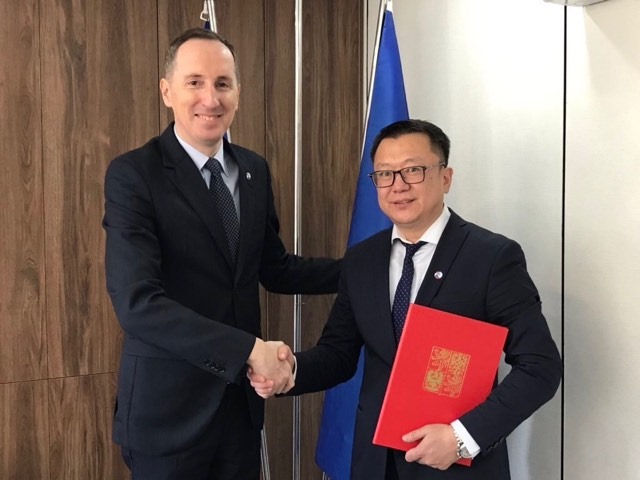
Czech Republic will promote its companies "doing business with Mongolia" interest www.mzv.cz/ulaanbaatar/mn
Foreign Ministry of Czech Republic just recently approved "Czech Business Support" (PROPEA) pilot project in Mongolia in order to specifically promote Czech exporters and investors interest in Mongolian market.
The project will aim to assist Czech companies business penetration into the market, reduce business risk, finding prospective Mongolian partners on the field (B2B) and promote business correspondence, communication, marketing and PR.
H.E.Mr.Jiri Brodsky Ambassador of Czech Republic to Mongolia indicated that the mission in Mongolia will actively support Czech-Mongolia economic growth and stabilize the regular business relations of two countries.
Ser-Od Ichinkhorloo Founder & CEO of Mongolian Business Database will coordinate/manage the project activities in Mongolia.
Mongolian Business Database (NGO) is the project managed by B2B Mongolia which aims to be the "Bridge of your business with Mongolia".
The www.mongolianbusinessdatabase.com B2B portal site is now number 1 ranking website on Google's "Mongolia business or/and Business Mongolia" search according to the business visitors access from appx 90 countries as of today (Google analytics report).
- «
- 1
- 2
- 3
- 4
- 5
- 6
- 7
- 8
- 9
- 10
- 11
- 12
- 13
- 14
- 15
- 16
- 17
- 18
- 19
- 20
- 21
- 22
- 23
- 24
- 25
- 26
- 27
- 28
- 29
- 30
- 31
- 32
- 33
- 34
- 35
- 36
- 37
- 38
- 39
- 40
- 41
- 42
- 43
- 44
- 45
- 46
- 47
- 48
- 49
- 50
- 51
- 52
- 53
- 54
- 55
- 56
- 57
- 58
- 59
- 60
- 61
- 62
- 63
- 64
- 65
- 66
- 67
- 68
- 69
- 70
- 71
- 72
- 73
- 74
- 75
- 76
- 77
- 78
- 79
- 80
- 81
- 82
- 83
- 84
- 85
- 86
- 87
- 88
- 89
- 90
- 91
- 92
- 93
- 94
- 95
- 96
- 97
- 98
- 99
- 100
- 101
- 102
- 103
- 104
- 105
- 106
- 107
- 108
- 109
- 110
- 111
- 112
- 113
- 114
- 115
- 116
- 117
- 118
- 119
- 120
- 121
- 122
- 123
- 124
- 125
- 126
- 127
- 128
- 129
- 130
- 131
- 132
- 133
- 134
- 135
- 136
- 137
- 138
- 139
- 140
- 141
- 142
- 143
- 144
- 145
- 146
- 147
- 148
- 149
- 150
- 151
- 152
- 153
- 154
- 155
- 156
- 157
- 158
- 159
- 160
- 161
- 162
- 163
- 164
- 165
- 166
- 167
- 168
- 169
- 170
- 171
- 172
- 173
- 174
- 175
- 176
- 177
- 178
- 179
- 180
- 181
- 182
- 183
- 184
- 185
- 186
- 187
- 188
- 189
- 190
- 191
- 192
- 193
- 194
- 195
- 196
- 197
- 198
- 199
- 200
- 201
- 202
- 203
- 204
- 205
- 206
- 207
- 208
- 209
- 210
- 211
- 212
- 213
- 214
- 215
- 216
- 217
- 218
- 219
- 220
- 221
- 222
- 223
- 224
- 225
- 226
- 227
- 228
- 229
- 230
- 231
- 232
- 233
- 234
- 235
- 236
- 237
- 238
- 239
- 240
- 241
- 242
- 243
- 244
- 245
- 246
- 247
- 248
- 249
- 250
- 251
- 252
- 253
- 254
- 255
- 256
- 257
- 258
- 259
- 260
- 261
- 262
- 263
- 264
- 265
- 266
- 267
- 268
- 269
- 270
- 271
- 272
- 273
- 274
- 275
- 276
- 277
- 278
- 279
- 280
- 281
- 282
- 283
- 284
- 285
- 286
- 287
- 288
- 289
- 290
- 291
- 292
- 293
- 294
- 295
- 296
- 297
- 298
- 299
- 300
- 301
- 302
- 303
- 304
- 305
- 306
- 307
- 308
- 309
- 310
- 311
- 312
- 313
- 314
- 315
- 316
- 317
- 318
- 319
- 320
- 321
- 322
- 323
- 324
- 325
- 326
- 327
- 328
- 329
- 330
- 331
- 332
- 333
- 334
- 335
- 336
- 337
- 338
- 339
- 340
- 341
- 342
- 343
- 344
- 345
- 346
- 347
- 348
- 349
- 350
- 351
- 352
- 353
- 354
- 355
- 356
- 357
- 358
- 359
- 360
- 361
- 362
- 363
- 364
- 365
- 366
- 367
- 368
- 369
- 370
- 371
- 372
- 373
- 374
- 375
- 376
- 377
- 378
- 379
- 380
- 381
- 382
- 383
- 384
- 385
- 386
- 387
- 388
- 389
- 390
- 391
- 392
- 393
- 394
- 395
- 396
- 397
- 398
- 399
- 400
- 401
- 402
- 403
- 404
- 405
- 406
- 407
- 408
- 409
- 410
- 411
- 412
- 413
- 414
- 415
- 416
- 417
- 418
- 419
- 420
- 421
- 422
- 423
- 424
- 425
- 426
- 427
- 428
- 429
- 430
- 431
- 432
- 433
- 434
- 435
- 436
- 437
- 438
- 439
- 440
- 441
- 442
- 443
- 444
- 445
- 446
- 447
- 448
- 449
- 450
- 451
- 452
- 453
- 454
- 455
- 456
- 457
- 458
- 459
- 460
- 461
- 462
- 463
- 464
- 465
- 466
- 467
- 468
- 469
- 470
- 471
- 472
- 473
- 474
- 475
- 476
- 477
- 478
- 479
- 480
- 481
- 482
- 483
- 484
- 485
- 486
- 487
- 488
- 489
- 490
- 491
- 492
- 493
- 494
- 495
- 496
- 497
- 498
- 499
- 500
- 501
- 502
- 503
- 504
- 505
- 506
- 507
- 508
- 509
- 510
- 511
- 512
- 513
- 514
- 515
- 516
- 517
- 518
- 519
- 520
- 521
- 522
- 523
- 524
- 525
- 526
- 527
- 528
- 529
- 530
- 531
- 532
- 533
- 534
- 535
- 536
- 537
- 538
- 539
- 540
- 541
- 542
- 543
- 544
- 545
- 546
- 547
- 548
- 549
- 550
- 551
- 552
- 553
- 554
- 555
- 556
- 557
- 558
- 559
- 560
- 561
- 562
- 563
- 564
- 565
- 566
- 567
- 568
- 569
- 570
- 571
- 572
- 573
- 574
- 575
- 576
- 577
- 578
- 579
- 580
- 581
- 582
- 583
- 584
- 585
- 586
- 587
- 588
- 589
- 590
- 591
- 592
- 593
- 594
- 595
- 596
- 597
- 598
- 599
- 600
- 601
- 602
- 603
- 604
- 605
- 606
- 607
- 608
- 609
- 610
- 611
- 612
- 613
- 614
- 615
- 616
- 617
- 618
- 619
- 620
- 621
- 622
- 623
- 624
- 625
- 626
- 627
- 628
- 629
- 630
- 631
- 632
- 633
- 634
- 635
- 636
- 637
- 638
- 639
- 640
- 641
- 642
- 643
- 644
- 645
- 646
- 647
- 648
- 649
- 650
- 651
- 652
- 653
- 654
- 655
- 656
- 657
- 658
- 659
- 660
- 661
- 662
- 663
- 664
- 665
- 666
- 667
- 668
- 669
- 670
- 671
- 672
- 673
- 674
- 675
- 676
- 677
- 678
- 679
- 680
- 681
- 682
- 683
- 684
- 685
- 686
- 687
- 688
- 689
- 690
- 691
- 692
- 693
- 694
- 695
- 696
- 697
- 698
- 699
- 700
- 701
- 702
- 703
- 704
- 705
- 706
- 707
- 708
- 709
- 710
- 711
- 712
- 713
- 714
- 715
- 716
- 717
- 718
- 719
- 720
- 721
- 722
- 723
- 724
- 725
- 726
- 727
- 728
- 729
- 730
- 731
- 732
- 733
- 734
- 735
- 736
- 737
- 738
- 739
- 740
- 741
- 742
- 743
- 744
- 745
- 746
- 747
- 748
- 749
- 750
- 751
- 752
- 753
- 754
- 755
- 756
- 757
- 758
- 759
- 760
- 761
- 762
- 763
- 764
- 765
- 766
- 767
- 768
- 769
- 770
- 771
- 772
- 773
- 774
- 775
- 776
- 777
- 778
- 779
- 780
- 781
- 782
- 783
- 784
- 785
- 786
- 787
- 788
- 789
- 790
- 791
- 792
- 793
- 794
- 795
- 796
- 797
- 798
- 799
- 800
- 801
- 802
- 803
- 804
- 805
- 806
- 807
- 808
- 809
- 810
- 811
- 812
- 813
- 814
- 815
- 816
- 817
- 818
- 819
- 820
- 821
- 822
- 823
- 824
- 825
- 826
- 827
- 828
- 829
- 830
- 831
- 832
- 833
- 834
- 835
- 836
- 837
- 838
- 839
- 840
- 841
- 842
- 843
- 844
- 845
- 846
- 847
- 848
- 849
- 850
- 851
- 852
- 853
- 854
- 855
- 856
- 857
- 858
- 859
- 860
- 861
- 862
- 863
- 864
- 865
- 866
- 867
- 868
- 869
- 870
- 871
- 872
- 873
- 874
- 875
- 876
- 877
- 878
- 879
- 880
- 881
- 882
- 883
- 884
- 885
- 886
- 887
- 888
- 889
- 890
- 891
- 892
- 893
- 894
- 895
- 896
- 897
- 898
- 899
- 900
- 901
- 902
- 903
- 904
- 905
- 906
- 907
- 908
- 909
- 910
- 911
- 912
- 913
- 914
- 915
- 916
- 917
- 918
- 919
- 920
- 921
- 922
- 923
- 924
- 925
- 926
- 927
- 928
- 929
- 930
- 931
- 932
- 933
- 934
- 935
- 936
- 937
- 938
- 939
- 940
- 941
- 942
- 943
- 944
- 945
- 946
- 947
- 948
- 949
- 950
- 951
- 952
- 953
- 954
- 955
- 956
- 957
- 958
- 959
- 960
- 961
- 962
- 963
- 964
- 965
- 966
- 967
- 968
- 969
- 970
- 971
- 972
- 973
- 974
- 975
- 976
- 977
- 978
- 979
- 980
- 981
- 982
- 983
- 984
- 985
- 986
- 987
- 988
- 989
- 990
- 991
- 992
- 993
- 994
- 995
- 996
- 997
- 998
- 999
- 1000
- 1001
- 1002
- 1003
- 1004
- 1005
- 1006
- 1007
- 1008
- 1009
- 1010
- 1011
- 1012
- 1013
- 1014
- 1015
- 1016
- 1017
- 1018
- 1019
- 1020
- 1021
- 1022
- 1023
- 1024
- 1025
- 1026
- 1027
- 1028
- 1029
- 1030
- 1031
- 1032
- 1033
- 1034
- 1035
- 1036
- 1037
- 1038
- 1039
- 1040
- 1041
- 1042
- 1043
- 1044
- 1045
- 1046
- 1047
- 1048
- 1049
- 1050
- 1051
- 1052
- 1053
- 1054
- 1055
- 1056
- 1057
- 1058
- 1059
- 1060
- 1061
- 1062
- 1063
- 1064
- 1065
- 1066
- 1067
- 1068
- 1069
- 1070
- 1071
- 1072
- 1073
- 1074
- 1075
- 1076
- 1077
- 1078
- 1079
- 1080
- 1081
- 1082
- 1083
- 1084
- 1085
- 1086
- 1087
- 1088
- 1089
- 1090
- 1091
- 1092
- 1093
- 1094
- 1095
- 1096
- 1097
- 1098
- 1099
- 1100
- 1101
- 1102
- 1103
- 1104
- 1105
- 1106
- 1107
- 1108
- 1109
- 1110
- 1111
- 1112
- 1113
- 1114
- 1115
- 1116
- 1117
- 1118
- 1119
- 1120
- 1121
- 1122
- 1123
- 1124
- 1125
- 1126
- 1127
- 1128
- 1129
- 1130
- 1131
- 1132
- 1133
- 1134
- 1135
- 1136
- 1137
- 1138
- 1139
- 1140
- 1141
- 1142
- 1143
- 1144
- 1145
- 1146
- 1147
- 1148
- 1149
- 1150
- 1151
- 1152
- 1153
- 1154
- 1155
- 1156
- 1157
- 1158
- 1159
- 1160
- 1161
- 1162
- 1163
- 1164
- 1165
- 1166
- 1167
- 1168
- 1169
- 1170
- 1171
- 1172
- 1173
- 1174
- 1175
- 1176
- 1177
- 1178
- 1179
- 1180
- 1181
- 1182
- 1183
- 1184
- 1185
- 1186
- 1187
- 1188
- 1189
- 1190
- 1191
- 1192
- 1193
- 1194
- 1195
- 1196
- 1197
- 1198
- 1199
- 1200
- 1201
- 1202
- 1203
- 1204
- 1205
- 1206
- 1207
- 1208
- 1209
- 1210
- 1211
- 1212
- 1213
- 1214
- 1215
- 1216
- 1217
- 1218
- 1219
- 1220
- 1221
- 1222
- 1223
- 1224
- 1225
- 1226
- 1227
- 1228
- 1229
- 1230
- 1231
- 1232
- 1233
- 1234
- 1235
- 1236
- 1237
- 1238
- 1239
- 1240
- 1241
- 1242
- 1243
- 1244
- 1245
- 1246
- 1247
- 1248
- 1249
- 1250
- 1251
- 1252
- 1253
- 1254
- 1255
- 1256
- 1257
- 1258
- 1259
- 1260
- 1261
- 1262
- 1263
- 1264
- 1265
- 1266
- 1267
- 1268
- 1269
- 1270
- 1271
- 1272
- 1273
- 1274
- 1275
- 1276
- 1277
- 1278
- 1279
- 1280
- 1281
- 1282
- 1283
- 1284
- 1285
- 1286
- 1287
- 1288
- 1289
- 1290
- 1291
- 1292
- 1293
- 1294
- 1295
- 1296
- 1297
- 1298
- 1299
- 1300
- 1301
- 1302
- 1303
- 1304
- 1305
- 1306
- 1307
- 1308
- 1309
- 1310
- 1311
- 1312
- 1313
- 1314
- 1315
- 1316
- 1317
- 1318
- 1319
- 1320
- 1321
- 1322
- 1323
- 1324
- 1325
- 1326
- 1327
- 1328
- 1329
- 1330
- 1331
- 1332
- 1333
- 1334
- 1335
- 1336
- 1337
- 1338
- 1339
- 1340
- 1341
- 1342
- 1343
- 1344
- 1345
- 1346
- 1347
- 1348
- 1349
- 1350
- 1351
- 1352
- 1353
- 1354
- 1355
- 1356
- 1357
- 1358
- 1359
- 1360
- 1361
- 1362
- 1363
- 1364
- 1365
- 1366
- 1367
- 1368
- 1369
- 1370
- 1371
- 1372
- 1373
- 1374
- 1375
- 1376
- 1377
- 1378
- 1379
- 1380
- 1381
- 1382
- 1383
- 1384
- 1385
- 1386
- 1387
- 1388
- 1389
- 1390
- 1391
- 1392
- 1393
- 1394
- 1395
- 1396
- 1397
- 1398
- 1399
- 1400
- 1401
- 1402
- 1403
- 1404
- 1405
- 1406
- 1407
- 1408
- 1409
- 1410
- 1411
- 1412
- 1413
- 1414
- 1415
- 1416
- 1417
- 1418
- 1419
- 1420
- 1421
- 1422
- 1423
- 1424
- 1425
- 1426
- 1427
- 1428
- 1429
- 1430
- 1431
- 1432
- 1433
- 1434
- 1435
- 1436
- 1437
- 1438
- 1439
- 1440
- 1441
- 1442
- 1443
- 1444
- 1445
- 1446
- 1447
- 1448
- 1449
- 1450
- 1451
- 1452
- 1453
- 1454
- 1455
- 1456
- 1457
- 1458
- 1459
- 1460
- 1461
- 1462
- 1463
- 1464
- 1465
- 1466
- 1467
- 1468
- 1469
- 1470
- 1471
- 1472
- 1473
- 1474
- 1475
- 1476
- 1477
- 1478
- 1479
- 1480
- 1481
- 1482
- 1483
- 1484
- 1485
- 1486
- 1487
- 1488
- 1489
- 1490
- 1491
- 1492
- 1493
- 1494
- 1495
- 1496
- 1497
- 1498
- 1499
- 1500
- 1501
- 1502
- 1503
- 1504
- 1505
- 1506
- 1507
- 1508
- 1509
- 1510
- 1511
- 1512
- 1513
- 1514
- 1515
- 1516
- 1517
- 1518
- 1519
- 1520
- 1521
- 1522
- 1523
- 1524
- 1525
- 1526
- 1527
- 1528
- 1529
- 1530
- 1531
- 1532
- 1533
- 1534
- 1535
- 1536
- 1537
- 1538
- 1539
- 1540
- 1541
- 1542
- 1543
- 1544
- 1545
- 1546
- 1547
- 1548
- 1549
- 1550
- 1551
- 1552
- 1553
- 1554
- 1555
- 1556
- 1557
- 1558
- 1559
- 1560
- 1561
- 1562
- 1563
- 1564
- 1565
- 1566
- 1567
- 1568
- 1569
- 1570
- 1571
- 1572
- 1573
- 1574
- 1575
- 1576
- 1577
- 1578
- 1579
- 1580
- 1581
- 1582
- 1583
- 1584
- 1585
- 1586
- 1587
- 1588
- 1589
- 1590
- 1591
- 1592
- 1593
- 1594
- 1595
- 1596
- 1597
- 1598
- 1599
- 1600
- 1601
- 1602
- 1603
- 1604
- 1605
- 1606
- 1607
- 1608
- 1609
- 1610
- 1611
- 1612
- 1613
- 1614
- 1615
- 1616
- 1617
- 1618
- 1619
- 1620
- 1621
- 1622
- 1623
- 1624
- 1625
- 1626
- 1627
- 1628
- 1629
- 1630
- 1631
- 1632
- 1633
- 1634
- 1635
- 1636
- 1637
- 1638
- 1639
- 1640
- 1641
- 1642
- 1643
- 1644
- 1645
- 1646
- 1647
- 1648
- 1649
- 1650
- 1651
- 1652
- 1653
- 1654
- 1655
- 1656
- 1657
- 1658
- 1659
- 1660
- 1661
- 1662
- 1663
- 1664
- 1665
- 1666
- 1667
- 1668
- 1669
- 1670
- 1671
- 1672
- 1673
- 1674
- 1675
- 1676
- 1677
- 1678
- 1679
- 1680
- 1681
- 1682
- 1683
- 1684
- 1685
- 1686
- 1687
- 1688
- 1689
- 1690
- 1691
- 1692
- 1693
- 1694
- 1695
- 1696
- 1697
- 1698
- 1699
- 1700
- 1701
- 1702
- 1703
- 1704
- 1705
- 1706
- 1707
- 1708
- 1709
- 1710
- 1711
- 1712
- 1713
- 1714
- »






